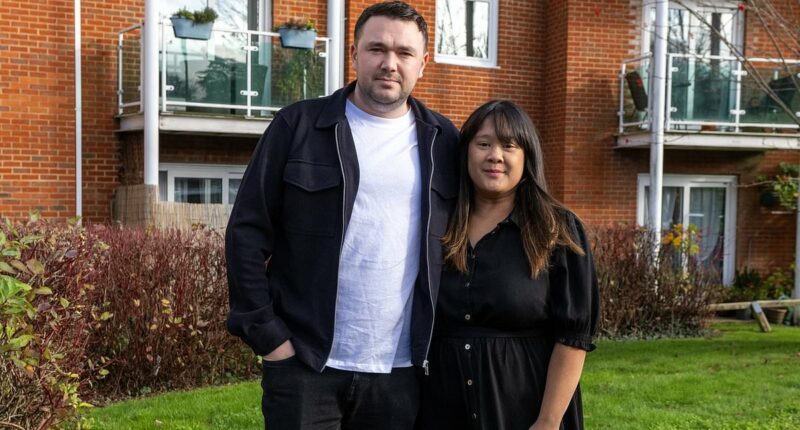Share this @internewscast.com
A young family finds themselves stuck with their leasehold flat, unable to sell it due to a steep increase in the service charge, now totaling £7,500.
Sam and Evangeline Thorn, both 33, have reduced the asking price of their two-bedroom home to less than what they paid seven years ago. However, potential buyers are deterred by the hefty fee.
The couple, who live in Redhill, Surrey, with their toddler daughter, wish to relocate to a larger house to accommodate a growing family as they plan for a second child.
Unfortunately, the Thorns have had to put their future plans on hold. They have cut back on expenses such as holidays to manage the unexpected service charge.
“It feels pointless to budget anymore,” Sam expressed.
“You set aside money for what you anticipate, and then the service charge arrives, far exceeding your expectations.”
Account manager Sam and his events coordinator wife Evangeline bought the flat for £245,000 in 2018. Back then, service charges were priced at £2,800.
Despite having the property valued at £300,000 last year, no buyers have come forward even after the couple dropped the asking price to just £220,000.

Sam and Evangeline Thorn, both aged 33, say they are unable to sell their leasehold flat in Redhill, Surrey, after their service charge soared to £7,500
Sam said: ‘We’ve had maybe 10 or so viewings with estate agents.
‘Every single person who liked it, when they were then made aware of the service charge cost, the estate agents told us that people didn’t want to go for another viewing.
‘They just weren’t interested.
‘It’s left us in a position where we’ve met with our mortgage advisor and they’ve said we’re financially in a position where we can get a bigger place.
‘We’re ready in our lives to have more children but we just need a bigger place.
‘Our mortgage advisor said “that’s fine, just sell it and you can buy for X amount”, and we physically can’t sell it.
‘We haven’t got enough room to have more children, so literally our lives are on pause at the moment.
‘It’s not just the financial strain of having to come up with £7,500 a year to pay these costs, but you’re also not able to move on to your life.
‘We’re just stuck where we are at the moment.’
Their flat, located in the 18-year-old Park25 development just a few miles from the M25, is managed by FirstPort.
The development is heated by a communal network – the costs of which are included in the service charge.
The network uses a mixture of gas and biomass boilers to heat hundreds of homes.
In 2024, FirstPort received a share of £3.5million in Government funding to increase the network’s efficiency.

The married couple have dropped the asking price on their home to lower than what they bought it for seven years ago, but say ‘people aren’t interested’ because of the high fee
And, according to the company, 51 per cent of the service charge is spent on energy costs.
But Sam said: ‘If you take that away, we’re still left with a bill of just under £4,000 a year for things like cutting the grass and lift maintenance.
‘We tried to sell the property when service charges were about that much and still couldn’t sell it.
‘Even if the heating were to be replaced, we’ve still got the issue that we’re just having our eyes pulled out by this company charging whatever they like.
‘We received a notification last week to say they went over budget last year and we’ll get a bill soon for what the excess costs were.
‘It’s about £80,000 over budget they’ve put under a section titled “general maintenance”.
‘They budgeted £16,000 and it cost over £90,000. It’s just figures they seem to pluck from thin air.
‘They’re supposed to be looking after people’s properties, but what they’re actually doing is ruining people’s lives.’
A FirstPort spokesperson said: ‘The heat network at Park 25 is becoming increasingly inefficient due to the failure of key components as the system ages.
‘These issues, combined with rising biomass fuel costs for the boilers, have been the main factors behind the recent increase in service charges.
‘Unfortunately, these cost pressures are outside of our control.
‘We remain committed to finding solutions, working with the government to provide the best outcome for our customers.
‘This includes exploring innovative options such as recycling waste heat from a neighbouring data centre to improve efficiency and reduce costs.
‘We have also secured an initial Heat Network Efficiency Scheme (HNES) grant to investigate how the heat network can improve for the benefit of residents.
‘A further application has been made to secure additional funding to support improvements.
‘We have met with residents and the local MP Rebecca Paul on several occasions to explain how service charges are calculated, what they include, and the significant impact of the heat network on total costs.
‘We’ve also taken steps to improve transparency for homeowners around costs introducing clearer invoices, detailed cost breakdowns, and more opportunities for residents to ask questions and provide feedback.’
















